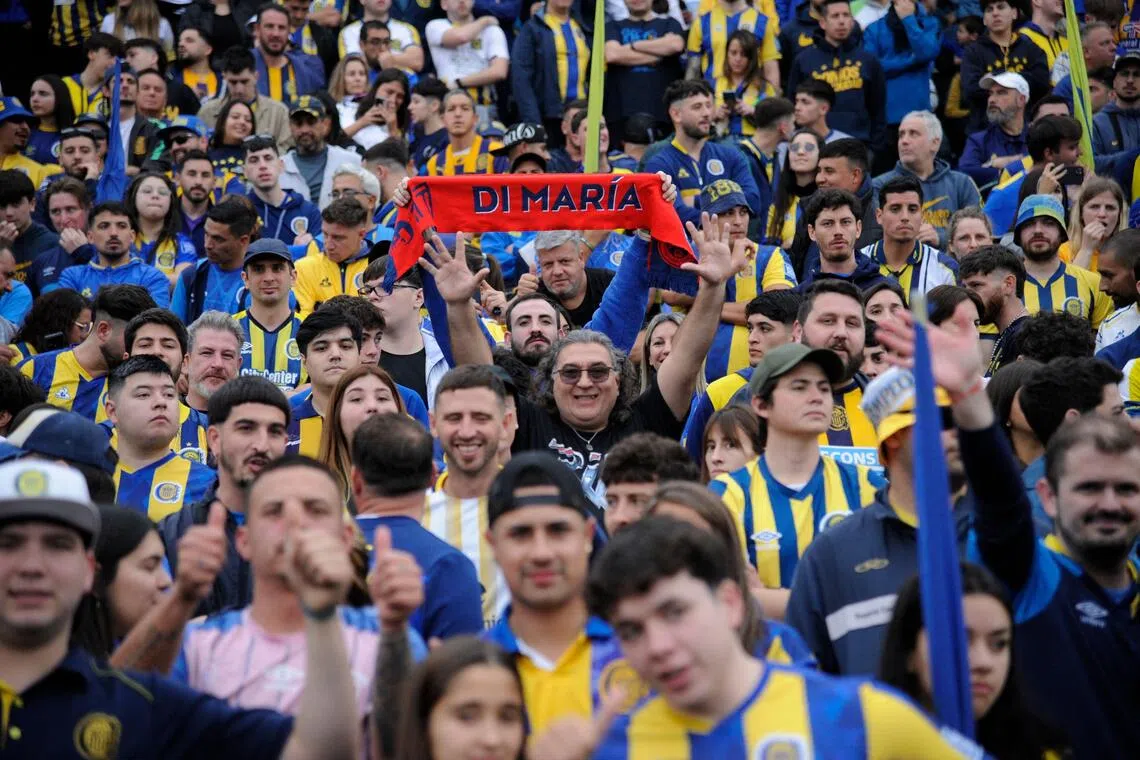Fans bewildered by Argentina’s complex top-flight football system
Sign up now: Get the biggest sports news in your inbox

A fan of Rosario Central attacker Angel di Maria cheering for him before a match at the Estadio Gigante de Arroyito.
PHOTO: AFP
BUENOS AIRES – With eight trophies up for grabs from 2026, a first division counting 30 teams and formats that can change seemingly on a whim, the Argentinian football league is at risk of alienating supporters in the home of the reigning World Cup champions.
Already somewhat of a rarity to outsiders with its two-stage season – each stage lasts six months and they are known as the Torneo Apertura (‘opening tournament’ in Spanish) and Torneo Clausura (‘closing tournament’ in Spanish) – the league has recently become even more singular.
The Argentinian Football Association (AFA) suddenly decided on Nov 20 to create a new title combining the clubs’ results in both championships – although there was no provision for this in the regulations at the start of the season.
As a result, former Real Madrid and Manchester United attacker Angel di Maria and his current club, Rosario Central, were unexpectedly declared the country’s champions just as they were preparing for their last-16 clash in the Clausura play-offs.
The newly crowned champions promptly lost the knockout tie 1-0 at home to Estudiantes de La Plata on Nov 23.
But nevertheless, the AFA had rewarded Rosario Central for being the team with the most points in the standings, which combine the points from its two half-yearly championships.
These consist of 30 teams divided into two groups, with both ending in a knockout phase.
It does not stop there, however. On top of these titles, there are also the cups and super cups, and the AFA has elected to add even more to the mix.
On Nov 20, it announced the creation of a new competition for next season, the Recopa de Campeones, which will feature the winners of the Copa Argentina, the Supercopa Argentina and the Supercopa Internacional.
This means that a total of eight titles will be up for grabs in 2026 in Argentina’s top flight.
But not all in the homeland of Lionel Messi, Diego Maradona and Daniel Passarella are amenable to these changes.
“No one understands it, everything changes all the time. The only sense to it is the game’s governors consolidating their power,” Andres Burgo, a journalist and author of several books on Argentinian football, told AFP.
This jumble of formats seems to be driven by commercial interests and is making Argentinian football increasingly difficult to understand, even for supporters.
“It’s a mess. Before, there were two tournaments (Apertura and Clausura), 20 teams, it was clear,” Tomas Menconi, a 33-year-old River Plate fan, told AFP.
“Now it’s impossible to follow. Local titles matter less and less”, he added.
In addition to bemoaning the absence of a single annual champion, another frequent criticism of the league is the diminishing standard of football in Argentina, whose clubs have not won the Copa Libertadores since 2018.
If fans are unsure about the state of the domestic game in Argentina, the league’s decision-makers back themselves.
Rosario Central president Gonzalo Belloso said upon receiving the unexpected title that the proliferation of tournaments reflects the existence of a “very united” football culture, which offers opportunities to both big and small clubs alike.
“Our championship is not a league for the few: it is popular, competitive and educational,” AFA president Claudio Tapia insisted last week on social media, after the new title was awarded.
However, in April, he acknowledged possible communication shortcomings when explaining the reason for this increase in matches and competitions – a trend already seen with the creation of the Club World Cup and expansion of the World Cup and Champions League.
As the national team prepare to defend their crown in the United States, Canada and Mexico in the summer of 2026, the breeding ground for much of the talent that constitutes the second-ranked side in the world would appear to be in much less rude health. AFP


